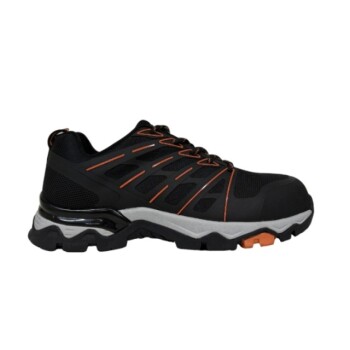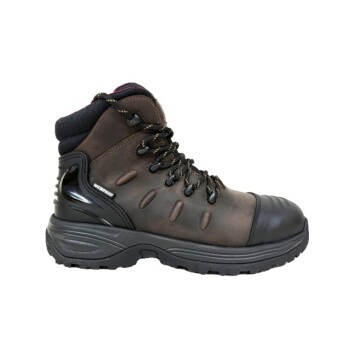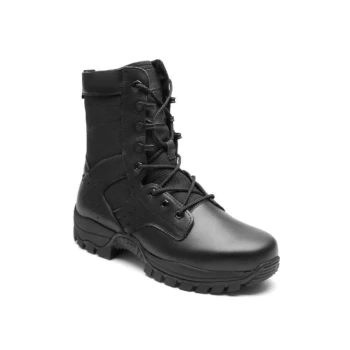The primary significance of oil-resistant soles in motorcycle boots is twofold: they provide critical grip on slick surfaces and prevent the material of the sole from degrading over time. This dual function ensures both immediate safety by reducing the risk of a slip and long-term reliability by maintaining the boot's structural integrity.
The core value of an oil-resistant sole is not just preventing a slip on an unexpected oil patch; it's about guaranteeing the sole's material won't break down, ensuring your boots provide consistent, reliable traction for their entire lifespan.
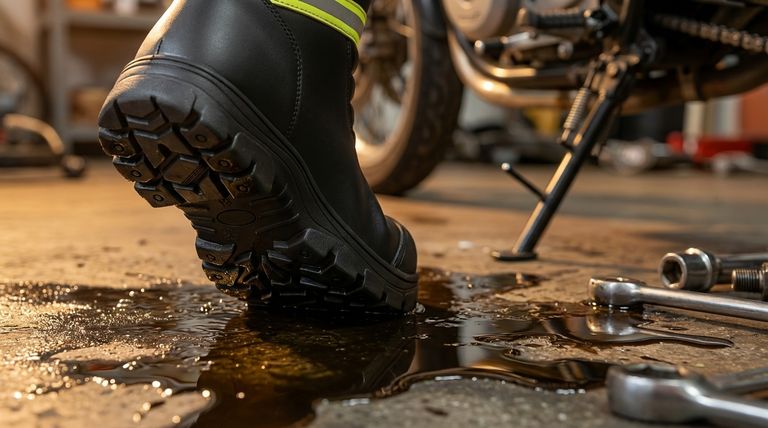
The Immediate Benefit: Preserving Grip
Why Oil Poses a Unique Risk
Riders constantly face unpredictable road conditions. Oil, fuel, and other automotive fluids are common hazards that dramatically reduce the friction between a boot and the asphalt.
When putting a foot down at a stop or during a low-speed maneuver, a standard sole can easily slip on these substances, potentially leading to a dropped bike or an injury.
How Oil-Resistant Soles Work
Oil-resistant soles are engineered from specific rubber or polyurethane compounds that have a high coefficient of friction, even when in contact with petroleum-based liquids.
These materials are non-porous and do not absorb the oil, allowing the sole to maintain its grip. The design often incorporates deep tread patterns designed to channel slippery liquids away from the contact patch, further enhancing traction.
The Long-Term Benefit: Preventing Material Degradation
The Corrosive Effect of Oil
Common oils and fuels are solvents that can break down the chemical bonds in standard rubber compounds. This process is a form of chemical decay.
The Consequences of Sole Degradation
When a non-resistant sole is repeatedly exposed to oil, it can become brittle, swell, or feel "gummy." This compromises the material's structural integrity.
A degraded sole loses its intended grip characteristics and its durability. It can lead to cracking or even the sole separating from the rest of the boot, rendering it unsafe and unusable. Oil resistance is fundamentally a feature of durability.
Understanding the Terminology
Oil-Resistant vs. Slip-Resistant
These terms are related but not interchangeable. Slip resistance is a broad category describing a sole's ability to prevent slips on various surfaces, most commonly water.
Oil resistance is a specific, crucial subset of slip resistance. It certifies that the sole not only provides grip on oily surfaces but also resists the chemical damage that oil can cause.
Why This Distinction Matters for Riders
For a motorcyclist, oil resistance is the more critical specification. While water is a common hazard, an oil or fuel spill presents a more severe risk due to its higher viscosity and chemical properties.
Therefore, a boot that is merely "slip-resistant" may still degrade or fail to provide adequate grip when it matters most. Always look for the specific "oil-resistant" designation.
Making the Right Choice for Your Safety
Choosing the right boot is about mitigating risk. An oil-resistant sole addresses a common and significant danger that every street rider faces.
- If your primary focus is daily commuting or touring: An oil-resistant sole is a non-negotiable safety feature for navigating unpredictable urban and highway environments.
- If your primary focus is casual weekend riding: This feature is still a fundamental safety requirement, as a single, unseen oil patch at a stoplight can cause a serious incident.
- If your primary focus is track riding: While the track surface is controlled, oil-resistant soles are still vital for the ride to and from the circuit, where road hazards are prevalent.
Ultimately, opting for an oil-resistant sole is a foundational investment in your safety and your gear's longevity.
Summary Table:
| Key Benefit | Description |
|---|---|
| Immediate Safety | Maintains grip on oil, fuel, and other slippery surfaces to prevent slips and falls. |
| Long-Term Durability | Resists chemical degradation from oil, preventing the sole from becoming brittle or gummy. |
| Material Integrity | Ensures the sole's structure and tread pattern remain effective for the boot's entire lifespan. |
As a leading manufacturer, 3515 produces high-performance motorcycle boots with certified oil-resistant soles for distributors, brand owners, and bulk clients. Our boots are engineered for maximum safety and durability, using advanced compounds to protect riders in all conditions.
Ensure your riders have the best protection — contact us today to discuss your footwear needs and explore our comprehensive range of motorcycle boots.
Visual Guide
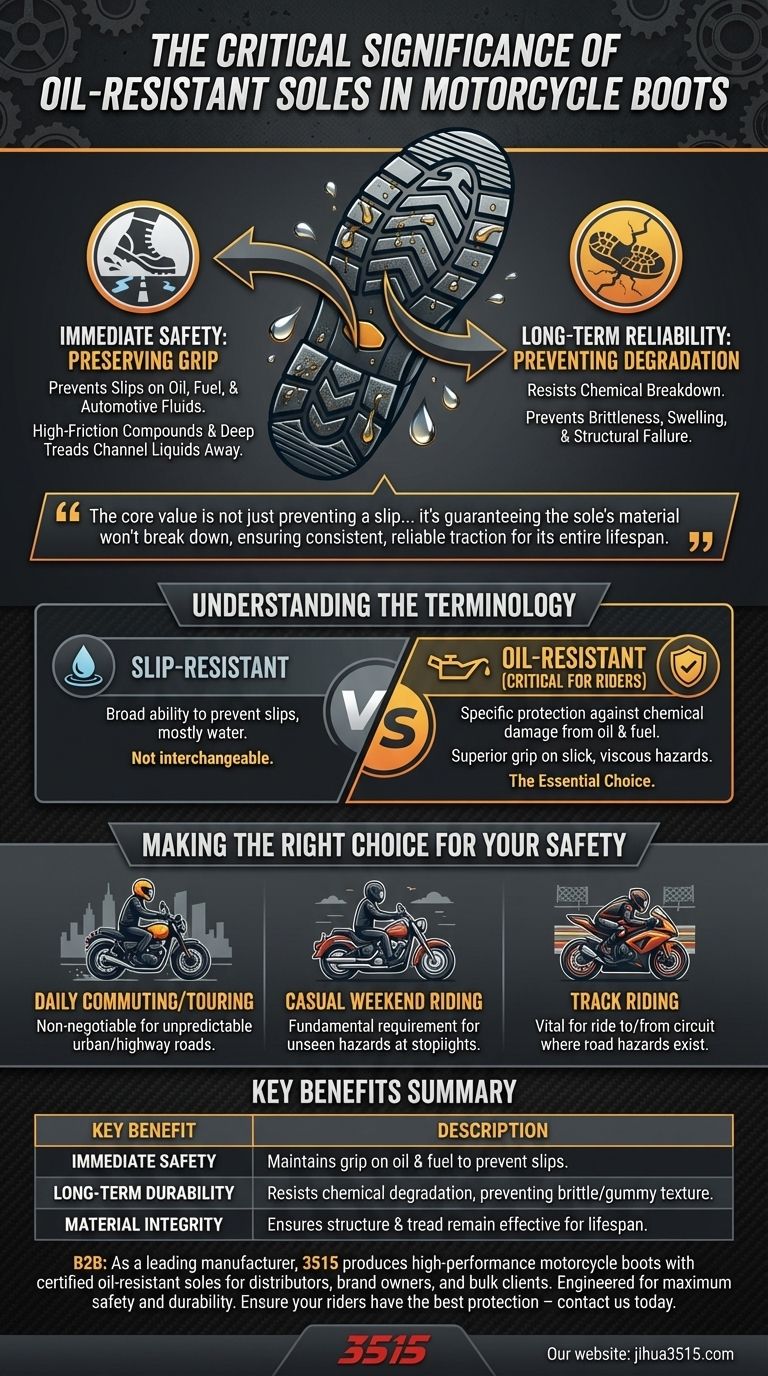
Related Products
- High Performance Fire-Retardant Waterproof Safety Boots
- Custom Wholesale Leather Safety Boots Direct Factory Manufacturing
- Premium Grain Leather Safety Boots for Bulk Supply
- Premium High-Cut Waterproof Safety Boots Manufacturing & Wholesale Solutions
- Premium KPU Injection Athletic Style Safety Shoes
People Also Ask
- What are the pros and cons of waterproof hunting boots? Choose the Right Boot for Your Hunt
- What material is primarily used in hunting shoes and boots? Unbeatable Neoprene for Wet & Cold Hunts
- What are riding shoes and what are their uses and limitations? Your Guide to Equestrian Footwear
- How do specialized boot features improve hunting performance? Boost Your Endurance & Success
- What are the key functions of industrial-grade microcontrollers in smart outdoor footwear? Powering Real-Time Safety
- Why are sandy surfaces considered a critical factor in the study of slip resistance for outdoor and construction footwear? Essential for Worker Safety.
- What type of boots are recommended for long-distance road trips? Choose Touring Boots for Safety and Comfort
- What features should hunting boots for mountainous terrain have? Essential Stability for Steep Hunts




